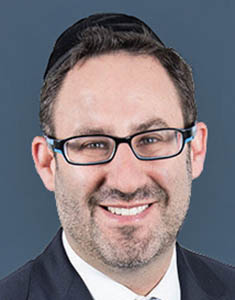
Join The Jewish Link of New Jersey on Facebook on Wednesday, 12/7 at 12 noon, for a live Q&A about dating references with Rabbi Cohen, featuring Mindy Eisenman, staff connecter at YU Connects! Feel free to ask them questions in advance to [email protected] that you would like them to address either in this session or in future articles. The conversation will also be archived for later viewing. Thanks to our social media partners The Orthodox Union and YUConnects!
At the turn of the century, I worked as a lawyer at the Manhattan firm of Simpson, Thacher and Bartlett. The etiquette of white shoe law firm culture in those days was genteel and giving a good reference when someone moved on (even under less than ideal terms) was considered sacrosanct. However, one candidate was particularly mediocre and his managing partner had major hesitations. The partner recommending decided to say to the prospective employer, “You’d be lucky to get him to work for you.” On it’s face, he was recommending him nicely. If you looked deeper, he was saying the guy is a “lazy good for nothing” and you’d be lucky to get any productivity out of him!
References are essential in many contexts, including the world of shidduchim and religious dating. I recently received a call to be a reference about a gentleman that used to be a congregant in my former shul. Ironically, the caller must have had an old resume, as I was sure this guy wouldn’t currently put me down as a reference for him. I just commented that we had lost touch and I couldn’t really say much about him at present. In truth, I had much to say, but decided to spare this poor fellow. I was also afraid that I might not be such an objective observer as I had some tense moments with him. Apparently, he hadn’t upgraded his shidduch resume in some time and was lucky to dodge this bullet.
Over time, relationships change, as do situations. It is important that shidduch candidates ensure that they have up-to-date resumes with the latest information and references that will vouch for them in the most positive of ways. It isn’t wise to test the middos or vindictiveness of a potential reference that may not be a great advocate for you.
On the flip side, I know someone who applied for a job and lost the opportunity because he was given a less than stellar reference from someone who held a grudge against him. This reference was not on the list of 10 or so people he submitted with his application. When the applicant inquired if they had spoken to any of the 10, the reply was no. The committee responded, “Since you submitted them, we knew they would speak nicely of you. We did our diligence, as we wanted dirt, not just the nice stuff.”
There are key lessons from both anecdotes I mentioned in the employment context. It is essential to listen very carefully to what is said as well as what isn’t said by any reference. If you ask well and listen well, you will discern well. However, it is relatively certain that most references on a resume will presumably say “good things.” For this reason, it is prudent to go beyond the resume and figure out who else may know this particular prospect. Everyone should call at least one additional reference not put forth by the person in question.
Many years ago, I dated someone with a complicated upbringing and a history of some emotional difficulties. The young lady recommended that I speak to a close friend of hers who happened to have been a respected teacher in a seminary. To my great surprise, the lady was very honest and up front about the complicated situation and wasn’t pushing the shidduch forward like many others did. The lady explained the complexities involved in very detailed fashion and accented what would be necessary for me to have a successful relationship with the girl in question.
In truth, she was doing a great service to her friend, ensuring she didn’t end up marrying someone not suited for her. Additionally, this women gained great credibility and respect in my eyes, as I was able to listen more confidently to the positive information she presented as well.
We must realize that if we aren’t balanced in our presentations to others, that we likely will have little credibility and won’t really be a valuable reference. There is much at stake in these inquiries and callers are looking for meaningful, authentic and truthful information.
Additionally, I once heard in the name of the Chazon Ish that an inquiring mate only finds out what they are destined to find out. That somehow, Hashem ensures that certain information only becomes revealed after a shidduch is completely consummated. With this in mind, one should not go overboard in their diligence efforts. Rather, they should make a good-faith effort and leave the rest to just play out. Even with this in mind, it is still important to realize that almost anyone in contact with us may be called as a reference and it is always a good idea to put our best foot forward in as many contexts as possible.
By Rabbi Dovid M. Cohen
Rabbi Dovid M. Cohen, Esq., M.Sc. works for the Orthodox Union in Synagogue Services and Yachad. He is the author of “We’re Almost There, Living with Patience, Perseverance and Purpose,” where a section of his new book is devoted to shidduchim and marital harmony. He maintains a small private counseling practice in Manhattan. To learn more go to www.rabbidovidmcohen.com.










